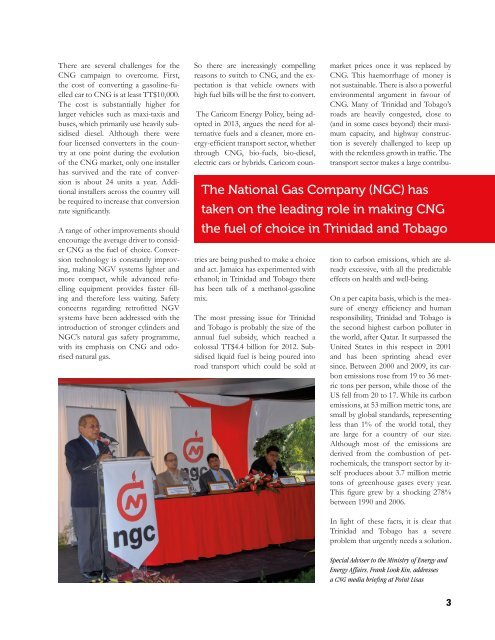GASCO News (Volume 24, November 2013)
Produced for the National Gas Company of Trinidad & Tobago
Produced for the National Gas Company of Trinidad & Tobago
Create successful ePaper yourself
Turn your PDF publications into a flip-book with our unique Google optimized e-Paper software.
There are several challenges for the<br />
CNG campaign to overcome. First,<br />
the cost of converting a gasoline-fuelled<br />
car to CNG is at least TT$10,000.<br />
The cost is substantially higher for<br />
larger vehicles such as maxi-taxis and<br />
buses, which primarily use heavily subsidised<br />
diesel. Although there were<br />
four licensed converters in the country<br />
at one point during the evolution<br />
of the CNG market, only one installer<br />
has survived and the rate of conversion<br />
is about <strong>24</strong> units a year. Additional<br />
installers across the country will<br />
be required to increase that conversion<br />
rate significantly.<br />
A range of other improvements should<br />
encourage the average driver to consider<br />
CNG as the fuel of choice. Conversion<br />
technology is constantly improving,<br />
making NGV systems lighter and<br />
more compact, while advanced refuelling<br />
equipment provides faster filling<br />
and therefore less waiting. Safety<br />
concerns regarding retrofitted NGV<br />
systems have been addressed with the<br />
introduction of stronger cylinders and<br />
NGC’s natural gas safety programme,<br />
with its emphasis on CNG and odorised<br />
natural gas.<br />
So there are increasingly compelling<br />
reasons to switch to CNG, and the expectation<br />
is that vehicle owners with<br />
high fuel bills will be the first to convert.<br />
The Caricom Energy Policy, being adopted<br />
in <strong>2013</strong>, argues the need for alternative<br />
fuels and a cleaner, more energy-efficient<br />
transport sector, whether<br />
through CNG, bio-fuels, bio-diesel,<br />
electric cars or hybrids. Caricom countries<br />
are being pushed to make a choice<br />
and act. Jamaica has experimented with<br />
ethanol; in Trinidad and Tobago there<br />
has been talk of a methanol-gasoline<br />
mix.<br />
The most pressing issue for Trinidad<br />
and Tobago is probably the size of the<br />
annual fuel subsidy, which reached a<br />
colossal TT$4.4 billion for 2012. Subsidised<br />
liquid fuel is being poured into<br />
road transport which could be sold at<br />
The National Gas Company (NGC) has<br />
taken on the leading role in making CNG<br />
the fuel of choice in Trinidad and Tobago<br />
market prices once it was replaced by<br />
CNG. This haemorrhage of money is<br />
not sustainable. There is also a powerful<br />
environmental argument in favour of<br />
CNG. Many of Trinidad and Tobago’s<br />
roads are heavily congested, close to<br />
(and in some cases beyond) their maximum<br />
capacity, and highway construction<br />
is severely challenged to keep up<br />
with the relentless growth in traffic. The<br />
transport sector makes a large contribution<br />
to carbon emissions, which are already<br />
excessive, with all the predictable<br />
effects on health and well-being.<br />
On a per capita basis, which is the measure<br />
of energy efficiency and human<br />
responsibility, Trinidad and Tobago is<br />
the second highest carbon polluter in<br />
the world, after Qatar. It surpassed the<br />
United States in this respect in 2001<br />
and has been sprinting ahead ever<br />
since. Between 2000 and 2009, its carbon<br />
emissions rose from 19 to 36 metric<br />
tons per person, while those of the<br />
US fell from 20 to 17. While its carbon<br />
emissions, at 53 million metric tons, are<br />
small by global standards, representing<br />
less than 1% of the world total, they<br />
are large for a country of our size.<br />
Although most of the emissions are<br />
derived from the combustion of petrochemicals,<br />
the transport sector by itself<br />
produces about 3.7 million metric<br />
tons of greenhouse gases every year.<br />
This figure grew by a shocking 278%<br />
between 1990 and 2006.<br />
In light of these facts, it is clear that<br />
Trinidad and Tobago has a severe<br />
problem that urgently needs a solution.<br />
Special Adviser to the Ministry of Energy and<br />
Energy Affairs, Frank Look Kin, addresses<br />
a CNG media briefing at Point Lisas<br />
3


















